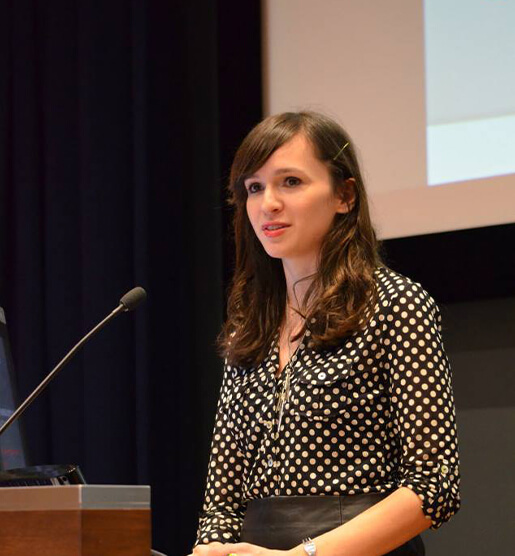Free shipping on all orders over $50 | Subscribe & save 15%
Free shipping on all orders over $50 | Subscribe & save 15%


I remember exactly when my bladder symptoms began. I woke up in the middle of the night with the most unimaginable pain in my bladder. For every night that followed, I would wake up with an intense urge to go to the bathroom. The bladder pain completely took over my life and robbed me of my sleep every night.
It was February 2008, and I was a student at Penn State University. One morning, I woke up with symptoms that felt like a urinary tract infection, or UTI. I knew the feeling because I had had a UTI two years prior, and it went away with antibiotic treatment. Familiar with the issue, I knew I had to get antibiotics before my trip to Florida. I was promoting a TV series I was involved in and didn’t want to deal with discomfort while traveling. So, I continued on with my day, intent to see the campus doctor for antibiotics before my trip.
All through my film and French classes, I kept getting up to go to the bathroom. Every time I had to pee, the pain in my bladder was agonizing. I felt pressure on my bladder and an intense urge to release.
At the campus doctor, they performed a routine urine culture test, which came back negative. So, it wasn’t a UTI. Nevertheless, I was prescribed antibiotics, but my symptoms still persisted. I took that flight to Florida, and I was miserable. I couldn’t stop getting up to go to the bathroom, and I had a window seat!
My bladder kept me in constant pain and was starting to make me feel self-conscious.

Back home, I probably saw between four to six doctors, trying to figure out what was wrong with me. Let’s just say I got really skilled at peeing in a cup. Urine culture after urine culture came back negative. Still, doctors kept prescribing the common medicines used to treat UTIs.
My symptoms stayed the same, and they were disrupting my entire life.
One doctor diagnosed me with an overactive bladder. I went through prescriptions of Vesicare and Detrol, yet my symptoms remained. Nothing seemed to help.
It wasn’t until I saw a urologist that I got the diagnosis that would change my life forever. The doctor performed an in-office procedure called a cystoscopy. Basically, he inserted a small, thin camera into my urethra to take a look inside my bladder. While pain varies depending on your body, this procedure was extremely painful for me.
The doctor informed me that my bladder wall was inflamed from all of the antibiotics I had taken. He also told me that I was one of the many women who was suffering from a bladder disease called Interstitial Cystitis. He handed me a DVD about the only Food and Drug Administration (FDA) approved drug for the condition, Elmiron, and I was out the door.
After the visit, I remember sitting in my car, staring at a DVD, and crying. I was still in pain from the procedure, but it was more than that. I had been suffering for so long because of misdiagnosis. I even had a bladder biopsy done to rule out bladder cancer and the results confirmed again that I did, in fact, have IC. So, I had the name of my condition, but no idea how I got it or how to properly treat it. I was confused and scared.

It seemed like no doctor I saw had enough knowledge about the condition to answer any of my questions. No one understood what I was going through. To make matters worse, the stress of everything only caused more inflammation and pain.
I was suffering, but I had not been defeated. It felt like I was living in a ridiculous nightmare, and I was desperate to have my life back again. I was young and fairly healthy with only a history of kidney stones. So, how did I develop IC?
I started researching online and turned to forums for support. I found the Interstitial Cystitis Association (ICA) and the Interstitial Cystitis Network and started talking to other IC patients. That’s when I learned how individualized the condition was for everyone. Everything, from the kinds of symptoms people experience to the severity of them to even which treatments work, varies from person to person.
For IC, most treatments also tend to be very invasive or have horrible side effects.
After six months of taking Elmiron, it finally started to work. Those were the longest six months of my life. My condition had worsened and most nights, I had to sleep on the bathroom floor. It was like having a full bladder on a road trip and not finding a restroom, except no matter how often I went to the bathroom, the pain and pressure remained. I started to log how many times I had to pee in a day, and it was over 50 at one point. Still, I kept a positive mindset and continued to search for answers.
During all of this mayhem, I was close to graduation and still traveling around the country for work. I felt like such a burden whenever we had to stop filming for me to rush to the restroom in the middle of taping. I had hoped to work as a camera operator in the entertainment industry after college. However, I felt like as long as I had to deal with IC, my dreams were impossible.
While Elmiron did work for me, it was so expensive that I couldn’t afford it after two years. I started seeing a specialist in Pittsburgh. Finally, there was a healthcare professional who I could talk to about my condition and who had experience treating other IC patients.
In 2012, it was recommended that I undergo the hydrodistension procedure. Needless to say, I was hesitant. Stretching a damaged bladder didn’t seem ideal to me. Also, I was terrified. I didn’t know if the procedure would help me and was worried about it worsening the pain I already felt. I ended up doing it anyway.
During recovery, I cried and screamed every time I peed. It felt like someone was stabbing me in the bladder with a knife. And worse, it hardly provided me with any relief. My only other options were to try bladder instillations or neuromodulation therapy. I was afraid that trying any of these treatments would worsen my symptoms, and I didn’t want to risk that.
Ultimately, relief came from a combination of things. I’ve gone through several rounds of pelvic floor physical therapy, maintained a positive mindset, and continue to eat a diet that works for me and my body. I’ve also tried medications, such as Ditropan and Myrabetriq, and supplements, like Femetry, to help ease my symptoms.
I’ve been living with Interstitial Cystitis for 15 years, and it still seems like a mystery. I’ve traveled all over the U.S. and have only met two other people who suffer from it. It’s an ongoing journey. I have good days and bad days. To this day, it’s still difficult for me to sleep uninterrupted through the night. While IC is a constant nuisance in my life, I hope my story acts as a beacon to shine light on this condition and let everyone know that I’m not just surviving with IC, I’m thriving.
